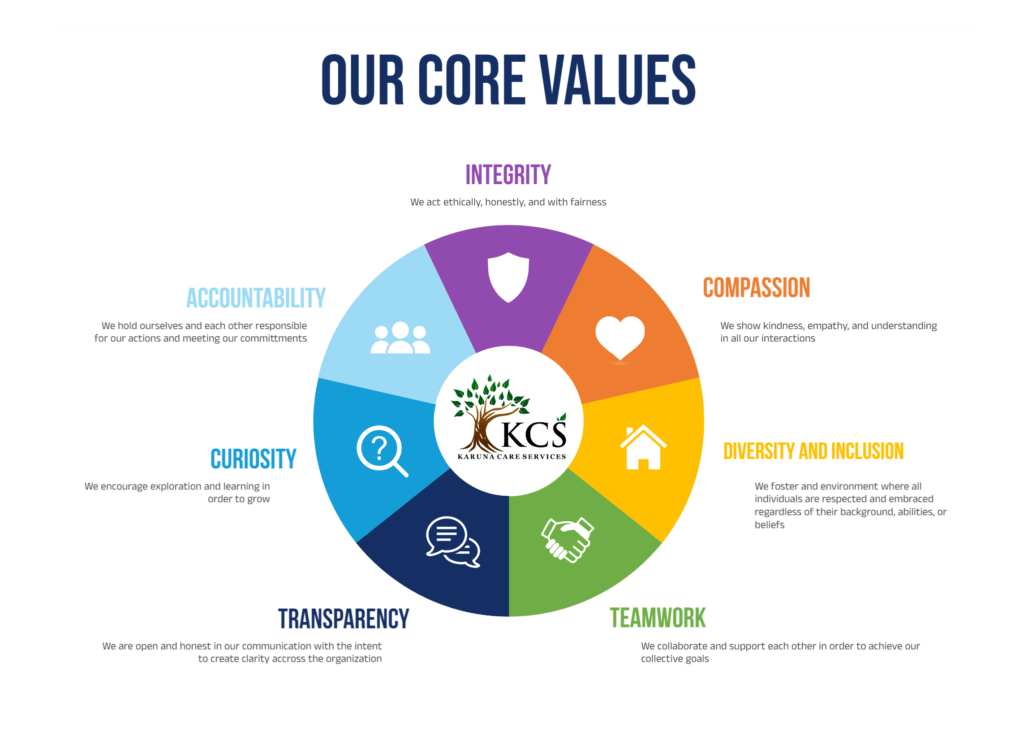

What services are available from KCS?
KCS currently provides Residential Services and Supports including the Host Home model, Family Caregiver Model, and Independent Model. KCS also provides Supported Community Connections, Non-Medical Transportation to and from Day Program. KCS also has a Family Recruited Employee program, Behavior Services Program, and Supported Employment Program.
What makes KCS different than other agencies?
KCS is a one-stop for person-centered HCBS-DD waiver services that support our community and the individuals we care for. We offer residential services, day habilitation, behavioral services, and supported employment. We pride ourselves on our positive culture, which is based on our employee created and led mission and values. We’ve hired the best team of employees, who add a wealth of knowledge and experience to our agency and team. KCS believes in exceptional, person-centered supports and believes everyone deserves to have supports that meet their needs as an individual. KCS believes in these principles first and foremost, regardless of agency size, and are driven to maintain quality over all else.
What does KCS do?
KCS provides a variety of services and supports to individuals with intellectual and developmental disabilities on the Developmental Disabilities or “DD” waiver in the state of Colorado.
What supports does KCS provide in emergencies?
KCS does it’s best to be prepared for a variety of emergency situations. We have two fully trained and available on-call staff assigned at a time, a residential program manager, and a back-up director. In each emergency, we work to understand the unique needs of the situation and provide tailored support. We can access a variety of prospective respite providers though our emergency distribution lists. Our team regularly collaborates on the emergency calls we receive, which ensure staff receive regular emergency training and that we’re constantly reviewing and innovating our processes. While we cannot anticipate every emergency, we have developed processes and training protocols to ensure we’re as prepared as possible.
What is your service area?
KCS provides supports primarily to individuals in Boulder and Broomfield Counties, but some services extend throughout Adams, Jefferson, and Weld Counties. We are always looking to provide quality services in other counties where possible, so feel free to inquire!
What does training look like for providers?
KCS has a training manager, Robyn, who supports with all provider training needs. Below are guidelines around provider training requirements:
All providers are expected to be trained in CPR/First Aid, which is then renewed every two years. We offer this training internally at our office or pay for providers to take the class through another approved entity (Red Cross). There is an online portion as well as a two hour in person practice session.
If a provider will be overseeing and/or administering the medication of an individual they support, they will be required to receiving their Qualified Medication Administration Personnel certificate. This is a one-time certificate with refresher courses required as needed. This is currently offered by an external agency nurse and requires online training and an online test.
If a provider will need to provide physical intervention on an individual they support, they will also be required to be certified annually in Safe Crisis Management, which is the model KCS uses for de-escalation and physical intervention techniques. This training is offered internally and has an online portion as well as a four hour in person practice session.
KCS also has a online course system, SkyPrep, where we enroll providers in annual training on KCS policies & procedures. This system also tracks the above provider training needs.
Is respite available?
Respite is the most frequently requested form of additional support but the biggest struggle to obtain. As an agency, we are always looking for respite providers and have a small list of possible options. We primarily find respite providers who are willing to offer respite in their home, making respite in the individuals home challenging to find. If respite is requested, we will send out an email to our prospective provider list in search of options. We will also work internally as a team to find solutions. Lastly, we have a Facebook group here that allows providers to post directly to other involved with KCS to search for options.
What are the KCS values?
Karuna Care Services prides itself in it’s values, and works hard to live by them each and every day. Here are our 7 core values:

What are the origins of KCS?
KCS was founded in 2013 by our founder, Tim Maxwell, on the belief that exceptional, person-centered services should be more available to our community, and that every individual deserves services that meet their needs. KCS started with one individual in services (in just transportation services, believe it or not!) and quickly grew to a small residential agency, supporting multiple families, over multiple counties.
How many individuals are we supporting?
KCS currently serves roughly 70 individuals in a variety of services
What does the monthly paperwork and workload look like for a provider?
KCS providers are expected to complete various forms of documentation based on the individual in their care’s needs. This could include the following:·
Daily: medication tracking, goal tracking, behavior tracking, Medicaid side effect tracking, controlled substance tracking, sleep tracking, diet tracking
Monthly: monthly summary notes, community access record, fire & severe weather drill, billing record
As Needed: medical appointment reports, incident report tracking
Providers are also expected to attend doctor’s appointments, team meetings, and other community activities to ensure proper care and support of the individual in their care.
How long is the Day Program waitlist?
Our ability to provide support depends on staffing availability, specific needs, and the space that we have available. At KCS we do our best to be as person centered as possible, and we try to pair individuals with people who have similar interests and ability levels. When a spot opens up we will evaluate the waitlist to determine if we have any individuals who would potentially fit in well with that specific spot. If there are multiple individuals who could be a good fit, we then go by the date individuals were entered into the waitlist. Due to these factors, timelines for support are difficult to determine and depend on individual circumstances.
What support does KCS provide during mental health or intense behavioral situations?
Our day program utilizes small group sizes and staff to client ratios to ensure that every individual receives the level of support they need to be successful in the community. All of our day program staff are trained in Safe Crisis Management (SCM), which teaches them how to effectively de-escalate potentially dangerous situations and gives them the tools to intervene if necessary to ensure the safety of all of our participants. During intense mental health or behavioral situations, KCS supervisors and directors are also available to provide back up support. Our behavior program is small, but growing and will hopefully provide further supports for a variety of intense situations.
Is KCS able to support with benefit management, including representative payee, Medicaid, and SSI?
KCS has a benefits specialist position designated solely to the support of representative payee, Medicaid Social Security Income, and other local benefits. We offer a fully compliant representative payee program, which aids with Medicaid and Social Security redeterminations, SSI/SSA management, Personal Needs Funds (PNF) and Room and Board management. Additionally, we support with the management of other benefits, like Section 8, SNAP, LEAP, and ABLE accounts.
Is income taxable for providers?
The Difficulty of Care income falls under federal government regulations as tax free income. Room and Board is Social Security Room and Board payment, which is taxable. The tax-exempt portion of income is defined under Title 26, Section 131 of the Internal Revenue Code. This falls under the “Foster Care Act” as difficulty of care income.
For any other questions you may have, please email [email protected].